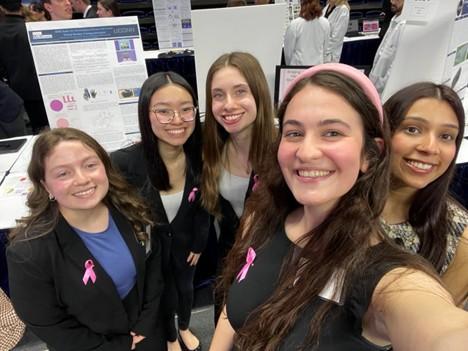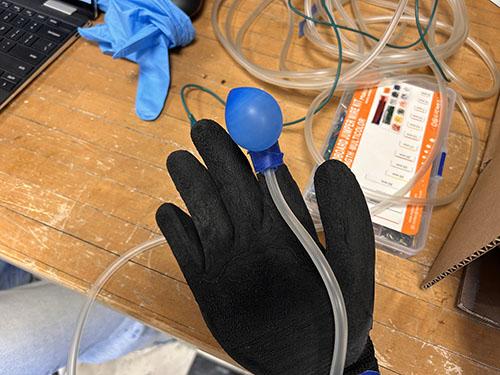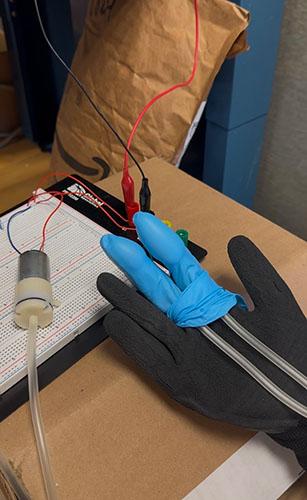From Interns to Innovators
These young engineers are behind a first-of-its-kind technology that could aid in the diagnosis of breast cancer
A pair of former interns will step into Medtronic jobs with an extraordinary project on their resumes: inventing a first-of-its-kind virtual reality simulator for self-breast exams.
Grace Bonacci and Carrie Nguyen — and their classmates at the University of Connecticut — developed the technology, which could aid in the diagnosis of breast cancer, in just eight months and with little budget (outside of a virtual reality headset, they spent less than $100).
Filling a gap
Not knowing how to perform a self-breast exam — or what to feel for — can be deterrents to performing them at all, said Dr. Leslie Holton, a research and technology innovation director in the Surgical Operating Unit at Medtronic.
Although 40% of diagnosed breast cancers are detected by women who feel a lump, and self-exams are simple and non-expensive, studies show only 32% of women know that self-breast exams are a method to screen for cancer.
Holton was a graduate student in her early 20s when she lost her own mother to metastatic breast cancer. The experience left her wondering: If women could get hands-on experience to learn what’s normal and what’s not in a self-exam, could it lead to earlier cancer detection?
“I really wanted to create a haptic feedback glove you could use to teach women how to do breast self-exams,” said Holton, whose background is in virtual reality medical education. “Back then, as many ideas are, it was well before its time.”
But when the idea was mentioned in a conversation between Holton and Dr. Krystyna Gielo-Perczak, a professor at the University of Connecticut who shared a passion for women’s health, it gained a second life. Medtronic quickly became a sponsor for a senior engineering design project under Gielo-Perczak’s guidance to turn Leslie’s long-time dream into reality.
“It’s at the time now where there’s the equipment to do this, the technology to do this,” Holton said.
Five students, including Bonacci and Nguyen, eagerly signed up for project, ranking it at the top of their most-desired list.
Unfiltered creativity
To bring it to life, Bonacci and Nguyen’s team of five built a glove partly made up of balloons that used haptic feedback, or technology that relies on a sense of touch. They acquired fake cancerous and non-cancerous breast tissue and took force measurements, translating the balloon’s response to a simulated nodule.
Wearing the glove, a user can get a sense for what feeling a potentially cancerous nodule in breast tissue feels like.
“As a woman, sometimes women’s health can be underrepresented in the broader medical community, or people are ashamed to talk about it,” Bonacci said. “That’s what drew me to this project.”
Emily Jacobs is a senior principal biomedical engineer at our company and mentored the students on the project. She’s also an intern-turned-employee herself. She helped the students troubleshoot problems, offered guidance about inclusivity for their design and business perspective, sourced materials, and served as a sounding board for their ideas.
“They were very inspired, driven, and independent,” said Jacobs, who earned a doctorate from the University of Connecticut. “It was fun to see them be really passionate about the project and it showed in their work.”
What’s next?
While there are no immediate plans to take the students’ design further, Medtronic walked away with learnings from their work, said Holton, including how they embraced a low fidelity approach.
“The vision that we started with, and that the students continued, was something that could be used in an OB-GYN’s office or on a mobile mammogram truck,” she said.
Among the skills they gained from the senior design project was maintaining a patient-centered mindset, Nguyen said.
“Something that Dr. Gielo-Perczak reminded us a lot while we were working on the project was to always remember and think about the human that's on the other end of your project,” she said.
In summer 2025, Medtronic welcomed 488 students to its internship program and 97 to its Women in Science & Engineering Early Outreach program. Fifty-seven percent of summer interns from 2024 who were eligible for conversion became full-time employees and 96% of all interns last year reported satisfaction in their experience.




